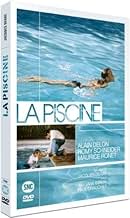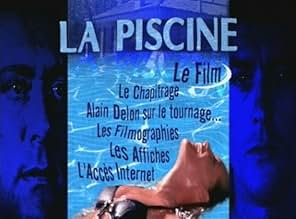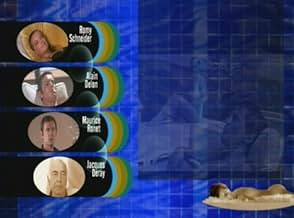AVALIAÇÃO DA IMDb
7,1/10
15 mil
SUA AVALIAÇÃO
Os amantes Marianne e Jean-Paul passam as férias em uma vila na Riviera francesa, perto de Saint-Tropez. Marianne convida seu ex-amante, Harry, e sua filha adolescente a ficar. A tensão aume... Ler tudoOs amantes Marianne e Jean-Paul passam as férias em uma vila na Riviera francesa, perto de Saint-Tropez. Marianne convida seu ex-amante, Harry, e sua filha adolescente a ficar. A tensão aumenta quando Jean-Paul seduz Penélope.Os amantes Marianne e Jean-Paul passam as férias em uma vila na Riviera francesa, perto de Saint-Tropez. Marianne convida seu ex-amante, Harry, e sua filha adolescente a ficar. A tensão aumenta quando Jean-Paul seduz Penélope.
- Direção
- Roteiristas
- Artistas
Maddly Bamy
- La mulâtre qui danse
- (as Madlybamy)
Steve Eckardt
- Fred
- (as Steve Eckart)
Stéphanie Fugain
- Une amie à la party
- (não creditado)
- Direção
- Roteiristas
- Elenco e equipe completos
- Produção, bilheteria e muito mais no IMDbPro
Avaliações em destaque
La piscine or The Swimming Pool is a French crime film, directed by Jacques Deray, who is known as a master of crime, and written by Jean-Claude Carriere; a long time companion of Luis Bunuel, for instance. La piscine isn't necessarily the most accessible French crime film but I would say it is one of the best, at least from the 1960's. It is an erotic, Antonionian film characterized by French existentialism. Although, it is not a perfect film, by any means, it is a surprisingly captivating and intriguing study on modern life as well as on alienation from the world and the society; loneliness, anxiety, love and freedom. The absurdity of being and the meaninglessness of life, how, in the end, nothing really matters.
The story happens somewhere in the French Riviera, where a couple is spending their holiday at a luxury château, borrowed from their friends. During the opening credits, we see reflections of nature on water: images of birds and trees. After the credits, the camera rises up and the water surface turns out to be a swimming pool, next to which there lies a man -- an insightful shot of the vacant and anguished life of the bourgeoisie. Everything was a lie; beauty and the happiness of life were only elusive reflections -- which happens to be the leading theme of Deray's film.
Soon we hear a woman shouting "Jean-Paul," and the man turns out to be Alain Delon. The woman (Romy Schneider) swims across the pool, comes to the man and they start kissing, fiercely. The physic happiness of this married couple is almost perfect. But details reveal pressures that begin to erupt, slowly, beneath the surface. In order to resist this anxiety, they make up the most shallow things for them to do and, therefore, invite a friend of theirs, Harry who surprisingly brings his 18-year-old daughter (Jane Birkin) with him. At a surprise party -- that resembles the party of The Night (1961) by Michelangelo Antonioni -- the pressures lead to tragic consequences.
La piscine strips seemingly beautiful and happy people down from their illusory facade. Jean-Paul turns out to be a failed writer whose fragile ego hides mysterious cruelty in it. On one level, he resembles Camus' Mersault as an apathetic and disregard man who has lost his lust for life. His wife, Marianne (Schneider) is, in turn, a prisoner of her emotions and is unable to free herself from the chains of her husband. Harry is good-looking and wealthy but, in reality, all of his relationships are elusive and mendacious. Nobody cares about him. His daughter, Penelope (Birkin) is a beautiful young woman who arises to her femininity but finds it hard to compete with Marianne.
Jacques Deray relays a competitive, jail-like vision of the lives of these characters. We see them behind bars, pillars and windows; trapped in an unending rat race. They are captivated like wild beasts, who are ready to kill each other at any second. Furthermore, all the characters are spying on each other: Jean-Paul keeps an eye on Marianne and Harry, for he thinks that they might have an affair. Harry, on the other hand, spies on Jean-Paul and Penelope because his juvenile father instincts can't bear a contestant. Marianne is also spying on them, because she thinks that she might lose the competition of Jean-Paul to a younger woman.
In the name of existentialist film, La piscine begins from nowhere and ends in somewhere which is quite the same. So why watch a film where nothing happens? Because, on the other hand, everything happens. Why read Kafka and watch Tarkovsky? For the very same reason. Although, La piscine is not a masterpiece, I would recommend it as an insightful film about loneliness and the illusion of idyllic life.
The story happens somewhere in the French Riviera, where a couple is spending their holiday at a luxury château, borrowed from their friends. During the opening credits, we see reflections of nature on water: images of birds and trees. After the credits, the camera rises up and the water surface turns out to be a swimming pool, next to which there lies a man -- an insightful shot of the vacant and anguished life of the bourgeoisie. Everything was a lie; beauty and the happiness of life were only elusive reflections -- which happens to be the leading theme of Deray's film.
Soon we hear a woman shouting "Jean-Paul," and the man turns out to be Alain Delon. The woman (Romy Schneider) swims across the pool, comes to the man and they start kissing, fiercely. The physic happiness of this married couple is almost perfect. But details reveal pressures that begin to erupt, slowly, beneath the surface. In order to resist this anxiety, they make up the most shallow things for them to do and, therefore, invite a friend of theirs, Harry who surprisingly brings his 18-year-old daughter (Jane Birkin) with him. At a surprise party -- that resembles the party of The Night (1961) by Michelangelo Antonioni -- the pressures lead to tragic consequences.
La piscine strips seemingly beautiful and happy people down from their illusory facade. Jean-Paul turns out to be a failed writer whose fragile ego hides mysterious cruelty in it. On one level, he resembles Camus' Mersault as an apathetic and disregard man who has lost his lust for life. His wife, Marianne (Schneider) is, in turn, a prisoner of her emotions and is unable to free herself from the chains of her husband. Harry is good-looking and wealthy but, in reality, all of his relationships are elusive and mendacious. Nobody cares about him. His daughter, Penelope (Birkin) is a beautiful young woman who arises to her femininity but finds it hard to compete with Marianne.
Jacques Deray relays a competitive, jail-like vision of the lives of these characters. We see them behind bars, pillars and windows; trapped in an unending rat race. They are captivated like wild beasts, who are ready to kill each other at any second. Furthermore, all the characters are spying on each other: Jean-Paul keeps an eye on Marianne and Harry, for he thinks that they might have an affair. Harry, on the other hand, spies on Jean-Paul and Penelope because his juvenile father instincts can't bear a contestant. Marianne is also spying on them, because she thinks that she might lose the competition of Jean-Paul to a younger woman.
In the name of existentialist film, La piscine begins from nowhere and ends in somewhere which is quite the same. So why watch a film where nothing happens? Because, on the other hand, everything happens. Why read Kafka and watch Tarkovsky? For the very same reason. Although, La piscine is not a masterpiece, I would recommend it as an insightful film about loneliness and the illusion of idyllic life.
I saw it few times with the nostalgia of the great first scenes. A film about love, hate, jealousy, games and death . Admirable work of Romy Schneider and Alain Delon and great craft of the nuances of story. And, sure, a young Jane Birkin , seductive and well acting.
Maybe, the remarkable good point remains the dialogue and the ambiguous games of characters. Sure, a classic , with its obvious virtuous but, more important, with few sins who, after a half of century are very near to the status of virtues.
A good cast and a fairs slice of thriller. And the summer proper reflected in the water of pool.
The most simple is to say : see it ! Not for story but for emotions inspired by a fist of scenes.
Maybe, the remarkable good point remains the dialogue and the ambiguous games of characters. Sure, a classic , with its obvious virtuous but, more important, with few sins who, after a half of century are very near to the status of virtues.
A good cast and a fairs slice of thriller. And the summer proper reflected in the water of pool.
The most simple is to say : see it ! Not for story but for emotions inspired by a fist of scenes.
A French drama; A story about crime in a sumptuous idyll. Still air. Mediterranean sun. One pool. Two lovers. Two guests. One is an old acquaintance to one and a former lover to another; the other is his daughter, a mystery to all. Hedonism, sensuality, eroticism, sexual longing, anxiety, and unfulfillment - it all leads to weakness for one and a dastardly deed. A film that is slow-moving and its drama as enervating as the heat over the villa could easily drain the energy of the viewer, but it is energising, and the camera loves these beautiful, chic people and the intrigue they create. The story is well written. The drama is well controlled.
Ignore the Naysayers, "La Pacine" is a masterful film. A true example of the kind of film they only really made in that area: vibrant and glossy, where a voyeuristic camera just hovers and lingers, putting the viewer right there. It reminded me a lot of Jean-Luc Godard's "Contempt." The way it is filmed makes the viewer want to be in that world, and stay there as long as possible. I know that South France in 1960's seems a hell of lot better than our world today. If "La Pacine" was 3 hours long, I would still sit through it, just to BE there.
I found the acting performances to be extraordinary. So much in this film is conveyed through body language and facial expressions, that one hardly even needs to know French (or read subtitles) to understand what it happening. Romy Schneider and Jane Birkin are both great to look at, and I thought Jane Birkin in particular really did well to say a lot with few words.
The only thing that slightly drags "La Pacine" down is that it's slightly overlong in the drawn out expository section after the climax, which causes the film to loose a bit of punch by the end. So come hang out by the pool for a while, I don't think you'll regret it.
I found the acting performances to be extraordinary. So much in this film is conveyed through body language and facial expressions, that one hardly even needs to know French (or read subtitles) to understand what it happening. Romy Schneider and Jane Birkin are both great to look at, and I thought Jane Birkin in particular really did well to say a lot with few words.
The only thing that slightly drags "La Pacine" down is that it's slightly overlong in the drawn out expository section after the climax, which causes the film to loose a bit of punch by the end. So come hang out by the pool for a while, I don't think you'll regret it.
And what eye candy - Alain Delon.
"La Piscine" is about two impossibly beautiful people in various stages of undress having a lot of foreplay. Or so it seems. Jean- Paul (Delon) and his lover (or wife, not sure) Marianne (Romy Schneider) are vacationing in a friend's mansion in Saint-Tropez. Lots of sun, making out, and swimming.
Marianne's ex-beau, Harry (Maurice Ronet) calls to say he's in the area, and Marianne invites him and his nubile daughter Penelope (Jane Birkin) to stay with him.
It's obvious that Harry still desires Marianne, so there is automatic tension. Then Jean-Paul seduces Penelope. Soon tension leads to something worse.
"La Piscine" is a typical foreign film - the ideas are sometimes obtuse, and it moves slowly. It's also too long by as much as a half hour. It's hard to concentrate on the plot because the beauty of the stars, Delon and Schneider, and their incredible chemistry overwhelm the story - to the extent that one doesn't really understand Jean- Paul's attraction to Penelope.
What erupts is the suppressed anger of the once-suicidal Jean-Paul, the competitiveness between him and Harry, and Harry's jealous possession of his daughter, whom he only recently met. As Penelope says, he likes to have her travel with him because people often think she's his mistress.
Schneider and Delon were a famous real-life couple but had broken up about five years earlier. Their chemistry is undeniable, and it's heartbreaking to think about what happened to her. Both actors give very "movie" performances - nothing overplayed, many subtle, nonverbal reactions. All of the acting is good, and the conflict scene between Harry and Jean-Paul is excellent.
"La Piscine" is considered a classic, but I believe many Americans had a hard time with it due to its languid pace and a tendency to look for action rather than psychology. Enjoy it for the beautiful photography and beautiful actors, if nothing else.
"La Piscine" is about two impossibly beautiful people in various stages of undress having a lot of foreplay. Or so it seems. Jean- Paul (Delon) and his lover (or wife, not sure) Marianne (Romy Schneider) are vacationing in a friend's mansion in Saint-Tropez. Lots of sun, making out, and swimming.
Marianne's ex-beau, Harry (Maurice Ronet) calls to say he's in the area, and Marianne invites him and his nubile daughter Penelope (Jane Birkin) to stay with him.
It's obvious that Harry still desires Marianne, so there is automatic tension. Then Jean-Paul seduces Penelope. Soon tension leads to something worse.
"La Piscine" is a typical foreign film - the ideas are sometimes obtuse, and it moves slowly. It's also too long by as much as a half hour. It's hard to concentrate on the plot because the beauty of the stars, Delon and Schneider, and their incredible chemistry overwhelm the story - to the extent that one doesn't really understand Jean- Paul's attraction to Penelope.
What erupts is the suppressed anger of the once-suicidal Jean-Paul, the competitiveness between him and Harry, and Harry's jealous possession of his daughter, whom he only recently met. As Penelope says, he likes to have her travel with him because people often think she's his mistress.
Schneider and Delon were a famous real-life couple but had broken up about five years earlier. Their chemistry is undeniable, and it's heartbreaking to think about what happened to her. Both actors give very "movie" performances - nothing overplayed, many subtle, nonverbal reactions. All of the acting is good, and the conflict scene between Harry and Jean-Paul is excellent.
"La Piscine" is considered a classic, but I believe many Americans had a hard time with it due to its languid pace and a tendency to look for action rather than psychology. Enjoy it for the beautiful photography and beautiful actors, if nothing else.
Alain Delon's Top 10 Films, Ranked
Alain Delon's Top 10 Films, Ranked
To celebrate the life and career of Alain Delon, the actor often credited with starring in some of the greatest European films of the 1960s and '70s, we rounded up his top 10 movies, ranked by IMDb fan ratings.
Você sabia?
- CuriosidadesThe film reunited a 1960's "mythical couple' Alain Delon and Romy Schneider. Schneider had dramatically broken-up with Delon couple years earlier and married German director and actor Harry Meyen in Berlin. She had a child, but Delon never truly let go. He began pursuing her again soon after their split, attempting to reconcile despite her new life. His determination was evident when he insisted on her being cast in the film, even threatening to quit if she wasn't included-despite producer Gérard Beytout's misgivings, as he was dubious about the actress from the Sissi (1955) trilogy in a bikini. During and after filming, Delon continued his relentless pursuit, and though Schneider repeatedly refused, their undeniable emotional connection translated into palpable on-screen chemistry. His efforts to win her back persisted long after the film, spanning much of her life and adding an emotional depth to their real and cinematic legacy.
- Erros de gravaçãoA body of someone that has just drowned does not float on water. Only after the decaying process has started and gases build up in the body does the body float to the surface.
- Cenas durante ou pós-créditosThe opening credits shimmer, as though they were being projected onto the surface of the swimming pool.
- Versões alternativasEnglish version. As all the cast, except Paul Crauchet, were fluent in English the scenes were shot both in French and in English. This version proves to be funny for the English-by-the-book used in the dialogue (obviously a line by line rendition of the original French script). The English version is also about ten minutes shorter with slightly different edit and has a few other differences (such as Romy Schneider wearing a bikini top in the English version in scenes where she is topless in the French version).
- ConexõesFeatured in La vengeance du serpent à plumes (1984)
Principais escolhas
Faça login para avaliar e ver a lista de recomendações personalizadas
- How long is The Swimming Pool?Fornecido pela Alexa
Detalhes
- Data de lançamento
- Países de origem
- Central de atendimento oficial
- Idiomas
- Também conhecido como
- La piscina
- Locações de filme
- Ramatuelle, Var, França(villa and swiming pool at L'Oumède)
- Empresas de produção
- Consulte mais créditos da empresa na IMDbPro
Bilheteria
- Faturamento bruto nos EUA e Canadá
- US$ 211.467
- Fim de semana de estreia nos EUA e Canadá
- US$ 3.867
- 16 de mai. de 2021
- Faturamento bruto mundial
- US$ 335.670
- Tempo de duração2 horas 2 minutos
- Mixagem de som
- Proporção
- 1.66 : 1
Contribua para esta página
Sugerir uma alteração ou adicionar conteúdo ausente


![Assistir a Bande-annonce [OV]](https://m.media-amazon.com/images/M/MV5BNzFiYWQzZjAtYjQ2Ni00ZWIzLTk4OTctNzg0NTNiMjc2ZjlkXkEyXkFqcGdeQXRyYW5zY29kZS13b3JrZmxvdw@@._V1_QL75_UX500_CR0)














